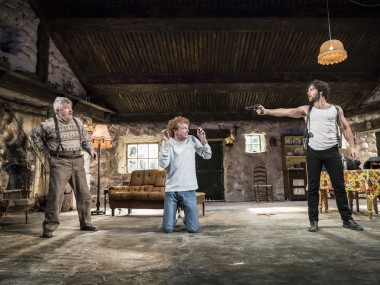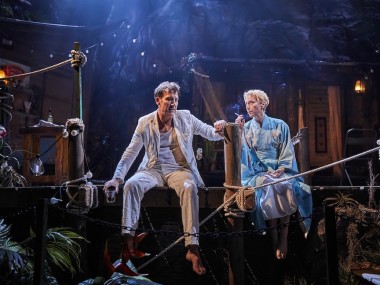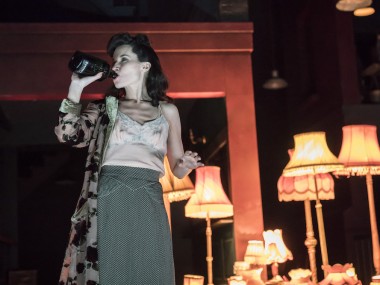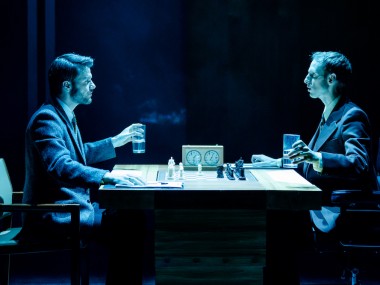Patriots, Noël Coward Theatre
Tuesday 6th June 2023
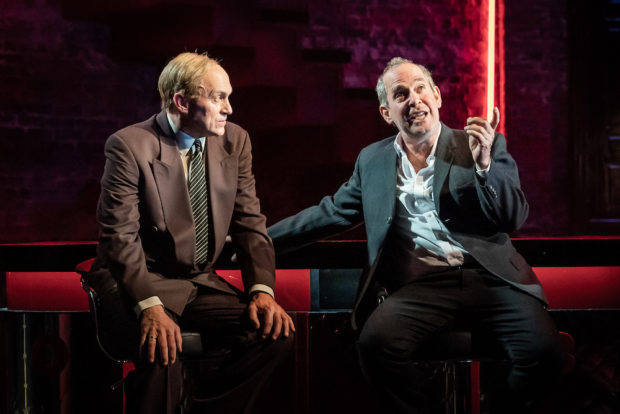
Putin says the West doesn’t understand Russia; often, the West acts as if he’s right. But how can theatre represent the most authoritarian, and merciless, Russian autocrat since Stalin? While a deep analysis of the state of Russia since Perestroika and the fall of the Soviet Union typically runs into 500 closely argued pages, or more, the stage offers something that books can’t quite convey. Firstly, the sense of a live debate, a real-time argument, and, secondly, a series of visual and verbal images that are imprinted on the minds of its audience. However, the project of commercial theatre is to entertain — does this mean it has to be superficial?
This West End transfer of Peter Morgan’s award-winning play, Patriots, is rich in debate, in images and in a distinct sense that there must be so much more to say, and know, about a country whose current war with Ukraine has made it so relevant to us all. First seen at the Almeida Theatre in July last year, this epic narrative by the writer behind The Crown and Frost/Nixon tells the abbreviated life story of Boris Berezovsky, the Russian oligarch and kingmaker who died in exile in London. To make the distant more understandable, the playwright also focuses on two men familiar to London audiences: Alexander Litvinenko, who was poisoned with polonium, and Roman Abramovich, onetime owner of Chelsea football club.
Starting with a nine-year-old Beresovsky, who was a maths prodigy during the old times of the Soviet Empire, the story unfolds with his abandonment of sheltered university life for the turbulent world of business during the wild west years of the 1990s, when Boris Yeltsin was president of the new Russian Federation. Originally a promoter and patron of Vladimir Putin, Berezovsky eventually falls out with him, and with his apprentice oligarch Abramovich, and flees to Londongrad. When Litvinenko, once a secret service officer and now a critic of Putin, gets murdered, Berezovsky struggles to keep control of his financial holdings — and feels the net closing in.
Although the title of the play suggests that both Putin and Berezovsky are patriots who love Russia, the piece shows how their interpretations of nationalism are very different. Berezovsky glories in his own intellectual gifts and believes that he and his capitalist enterprises alone can nudge Russia onto the sunlit uplands of global influence and prosperity; Putin wants to expand Russian power over its former Soviet republics and to crack down on the profiteering oligarchs, especially those who look down on him. Although he is represented, as you would expect, as the villain, is Berezovsky really such a hero?
Because this is a drama, full of long discussions about patriotism, loyalty and betrayal, there is a quasi-Shakespearean architecture to the story. Like the bard’s history plays, the suggestion of a father (Berezovsky) and son (Putin) relationship gives emotional power to the conflict between these men. At the same time, Berezovsky also has a father figure, his mentor, the young mathematics professor Grigori Perelman, whose ambition is to live quietly at home with his mother and put Russia on the Nobel Prize map by solving obscure theoretical problems, here explained as aids to decision-making. Another theme is anti-Semitism, which affects the attitudes of those in power to the entrepreneurial new men of the oligarchy.
All this is presented in a vivid style, partly larger than life and partly grotesque, which is, I suppose, how we in the West like to see Russian history. Although Morgan begins and ends the show with comments about the clichés of the Western view of Russia, the rest of the evening represents events as a kind of gothic horror exhibition, saturated with blood-red lighting, huge cavernous spaces and pulsing music. It’s a mix of the carnivalesque with the didactic, with long discussions about politics, and the concept of “krysha”, a way of protecting businesses against criminals. Yes, all very McMafia. And, in typical Shakespearean fashion, Berezovsky’s suicide in 2013 is accompanied by the ghost of Litvinenko and not by a skeptical investigation.
But the central problem of focusing on Berezovsky is the age-old one of creating an “enemy of my enemy is my friend” situation. While no one would dispute that Putin is our enemy, Berezovsky is an uncomfortable fit for a hero. However charming and decisive in this version of his life, surely his business and political dealings were just as unsavoury as those of his fellow oligarchs, and I’m not convinced that the energy they spent on profiteering schemes made them better patriots than the more statist-oriented Putin, and his cronies.
Still Morgan’s account is not only thrillingly staged by Rupert Goold, and colourfully designed by Miriam Buether, but also stars the brilliant Tom Hollander in the mesmerizing central role. With his wonderful self confidence and wit, he dominates the evening. Likewise Will Keen is a memorably creepy Putin. These two are ably supported by Luke Thallon as Abramovich, Josef Davies as Litvinenko and Ronald Guttman as Perelman. If the result is an enjoyable fantasy rather than a hard-hitting documentary the play’s success testifies to the fact that this is exactly how we wish to think of Russia: as a charmingly horrific grand opera, part comedy and part tragedy. It’s entertaining, it’s simple, it’s unreal; but that is why we like it.
This review first appeared on The Theatre Times

